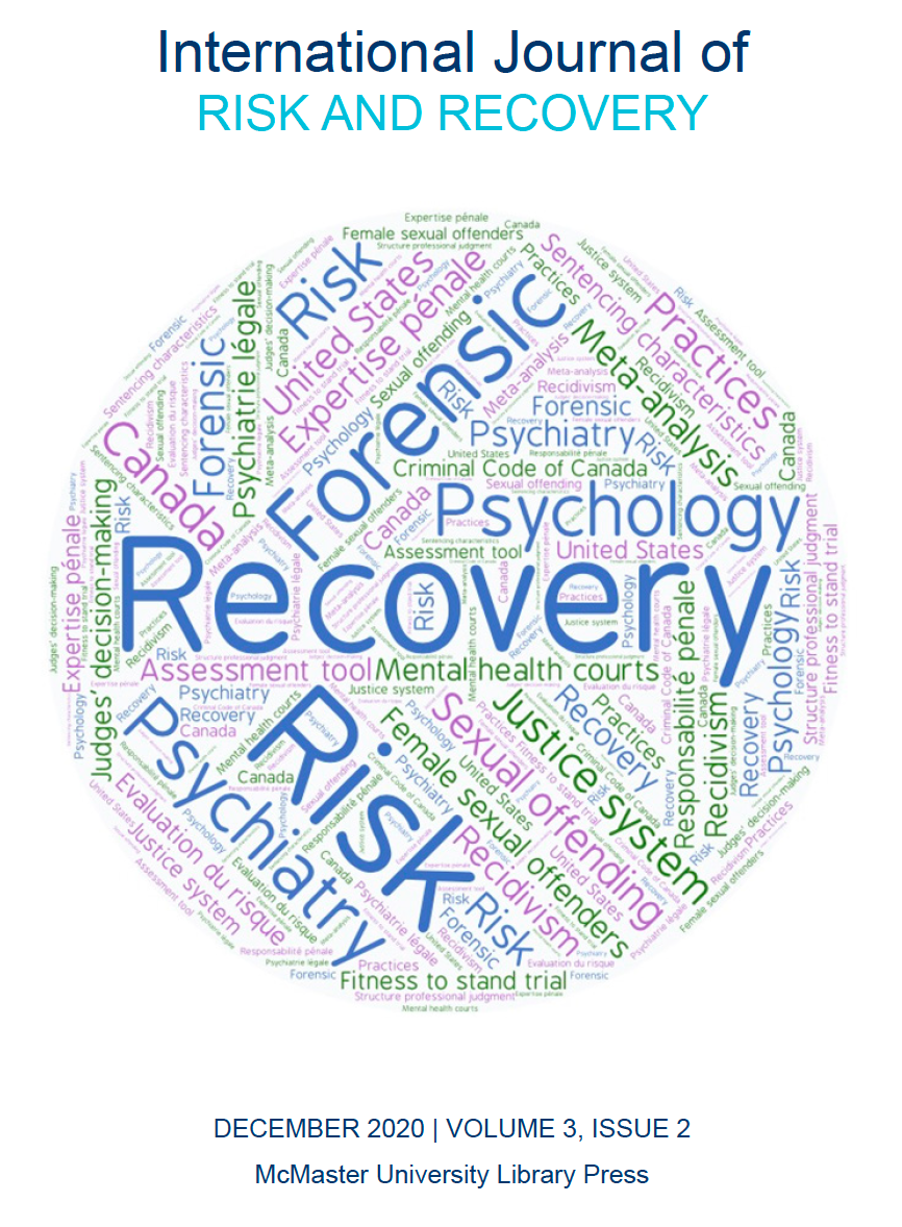Forensic psychiatry in Canada and France
Overview of its involvement in criminal proceedings
DOI:
https://doi.org/10.15173/ijrr.v3i1.4089Keywords:
Forensic psychiatry, Court ordered assessment, risk assessment, criminal responsibility, Forensic psychiatry, Court ordered assessment, Risk assessment, Criminal responsibilityAbstract
Completing court ordered psychiatric assessments is part of forensic psychiatry. Its characteristics and how it is practiced depend on the legal background where this is applied. Also, the financial resources that are put into this discipline play a role as to process and structure that guide how these assessments take place. Therefore, differences exist between countries and jurisdiction which may appear surprising because general psychiatry is mainly practiced the same way all over the world. In this paper, we compare the practice of criminal court ordered psychiatric assessments between France and Canada.
References
Code Criminel Canadien, L.R.C. (1985) ch. C-46 (dernière modification 19 septembre 2018). (consulté le 4 septembre 2019)
R v Taylor, (1992), 77 CCC (3d) 551, [1992] O.J. No. 2394 (Ont. C.A.) (consulté le 4 sep-tembre 2019)
Loi sur la Santé Mentale de l’Ontario, L.R.O ch. M-7 (dernière mise à jour 21 décembre 2015). (consulté le 4 septembre 2019)
Winkov British Columbia (ForensicPsychiatric Institute), [1999] 2 S.C.R. 625. (consulté le 4 septembre 2019)
R. v. Owen, [2003] 1 S.C.R. 779, 2003 SCC 33. (consulté le 4 septembre 2019)
Royal College of Physicians and Surgeons of Canada. Objectives of training in the subspe-cialty of Forensic Psychiatry. (consulté le 4 septembre 2019)
Legal Aid of Ontario. Disbursements Handbook. (consulté le 4 septembre 2019)
Prat SS, Praud N, Barney L. Criminal court ordered assessment in France and Canada: a comparison. Int J Risk Recov 2018;1(2):32-35
Loi n° 2014-896 du 15 août 2014 relative à l'individualisation des peines et renforçant l'efficacité des sanctions pénales. JORF 17 aout 2014. (consulté le 4 septembre 2019)
Loi n° 2011-803 du 5 juillet 2011 relative aux droits et à la protection des personnes faisant l'objet de soins psychiatriques et aux modalités de leur prise en charge. JORF n°0155 du 6 juillet 2011. (consulté le 4 septembre 2019)
Loi n° 2013-869 du 27 septembre 2013 modi-fiant certaines dispositions issues de la loi n° 2011-803 du 5 juillet 2011 relative aux droits et à la protection des personnes faisant l'objet de soins psychiatriques et aux modalités de leur prise en charge. JORF n°0227 du 29 septembre 2013. (consulté le 4 septembre 2019)
Loi n° 2008-174 du 25 février 2008 relative à la rétention de sûreté et à la déclaration d'irresponsabilité pénale pour cause de trouble mental. JORF n°0048 du 26 février 2008. (consulté le 4 septembre 2019)
Décret n° 2007-1627 du 16 novembre 2007 modifiant le code de procédure pénale (troi-sième partie : Décrets) et renforçant le recours aux aménagements de peines et la lutte contre la récidive. JORF n°268 du 18 novembre 2007. (consulté le 4 septembre 2019)
Décret n° 2008-764 du 30 juillet 2008 relatif au recouvrement des amendes forfaitaires et à certains frais de justice criminelle ou assimilés. JORF n°0179 du 2 aout 2008. (consulté le 4 septembre 2019)
Downloads
Published
How to Cite
Issue
Section
License
Copyright Notice
Authors who publish with this journal agree to the following terms:
- Authors retain copyright of their work and grant the International Journal of Risk and Recovery the right of first publication with the work simultaneously licensed under a Creative Commons Attribution License. This allows others to share the work with an acknowledgement of the work’s authorship and initial publication in this journal.
- Authors are able to enter into separate, additional contractual arrangements for the non-exclusive distribution of the journal’s published version of the work (e.g., post it to an institutional repository or publish it in a book) with an acknowledgement of its initial publication in this journal.
- Authors are permitted and encouraged to post their work online (e.g., in institutional repositories or on their websites) before and during the submission process as it can lead to productive exchanges, as well as earlier and greater citation of published work. (See The Effect of Open Access.)

